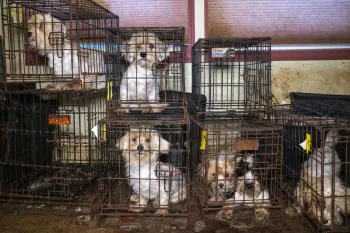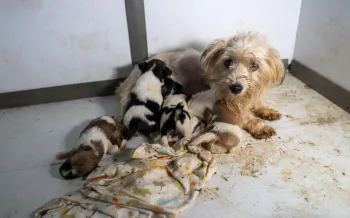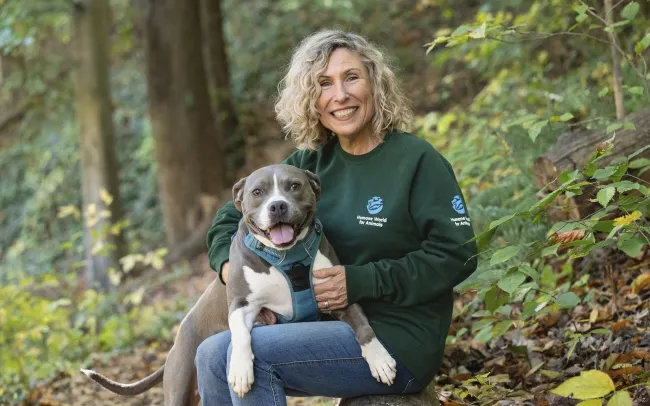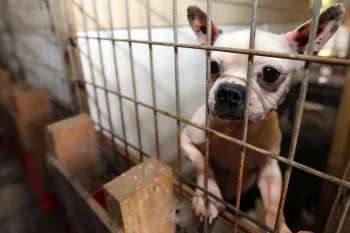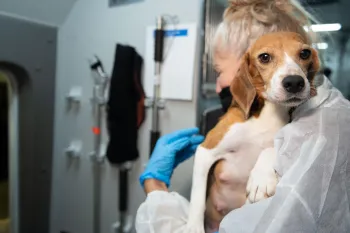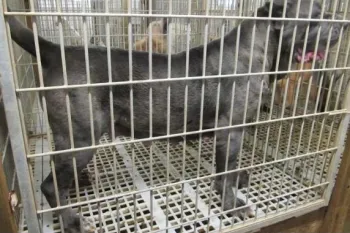“You can’t even tell where the leg ends and the matting begins.” That was what one of our responders said about several dogs who were discovered so severely matted with feces-encrusted fur after our Animal Rescue Team entered a residence in Havre De Grace, Maryland, with law enforcement officials last week. Most of the dogs found at this breeding operation of Havanese and Biewer terrier dogs were crammed into stacked wire-bottom cages with no access to food or water. Some cages had as many as three dogs crammed into a 12-by-18-inch space, and the dogs couldn't help but step and lie on top of each other.
Our team, which deployed at the request of the Harford County Sheriff’s Office, surveyed the premises and was at first overwhelmed by the burning sensation of ammonia and stench of feces. Ultimately, they rescued over 100 dogs and puppies and brought them to safety from these deplorable conditions.
The walls of the house smeared with filth, prominently displayed numerous American Kennel Club ribbons and certificates. On the side of a vehicle in the driveway, an advertisement read “HAVANESE AKC.”
The day after the rescue, our team set to work grooming the dogs to free them of their heavy and painful mats, revealing skinny, shivering dogs. Only then could veterinarians fully assess their body conditions, finding many were emaciated and malnourished.
Two dogs were hospitalized on the night of the rescue operation, requiring treatment for severe dehydration and painful abscesses. Many of the dogs rescued from the property required help for appallingly overgrown nails and treatment for ear mites. Most also need surgical intervention for dental disease.
This situation underscores a sad truth our Stop Puppy Mills Campaign knows all too well: People who want to add a dog or puppy to their family cannot rely on adorable photos, AKC-celebrated pedigrees or assurances from pet stores and online platforms that claim to evaluate breeders. That’s because, where there’s love for companion animals, there is money to be made, and puppy mills will always take advantage of people’s enthusiasm for adding a companion animal to their home. Massive commercial dog breeding operations can maximize profits by providing minimal care, a business model that generally results in adverse health and behavioral effects on the pups after they are purchased and brought home, even for the rest of their lives.
Whenever we rescue animals from alleged neglect situations like the one in Havre de Grace, or field inquiries about our annual Horrible Hundred puppy mills report, we often get questions about whether it’s legal to breed puppies on a massive scale. It is. But only certain operations fit the criteria for a license from the U.S. Department of Agriculture, which is the federal agency that oversees the enforcement of the Animal Welfare Act.
The agency’s enforcement patterns can vary, and too often USDA inspections and enforcement lack bite in holding breeding operations accountable for the humane treatment dogs deserve. And the AKC shows time and again that it cares about profits over the welfare of dogs, lobbying against regulations and laws that would really crack down on puppy mills. Moreover, the AKC’s flimsy certifications and inspections provide a dangerously misleading semblance of legitimacy about breeding operations where dogs and puppies may be suffering terribly.
Fighting the cruelty that the puppy mill industry inflicts on the dogs it treats as little more than commodities requires two main approaches. First, we must raise awareness among members of the public so that puppy mills can no longer hoodwink dog-loving consumers. Second, we need to continue to pursue humane legislation and regulations of these facilities to give the dogs who are there right now a chance at better care.
While we continue to fight for stronger protections for dogs, the public must be vigilant in avoiding contributing to the cycle of suffering that occurs in the puppy mill industry. That means choosing adoption first when seeking a new pet or buying only from carefully screened breeders after visiting the breeding operation in person to meet the breeding parents and see their living conditions.
You can also help dogs by supporting enhanced animal protection laws at the state, local and federal levels in the U.S. Currently, at the federal level, you can express your support for the Better Collaboration, Accountability, and Regulatory Enforcement (CARE) for Animals Act and the Puppy Protection Act. Both are gaining momentum and congressional sponsors in the 119th Congress.
Achieving a better future for animals is possible. This is the deep belief we carry through every rescue and every campaign. Stopping the puppy mill industry is at the top of our priorities, and everyone can be a part of advocating for the better treatment of dogs.
Sara Amundson is president of Humane World Action Fund.
